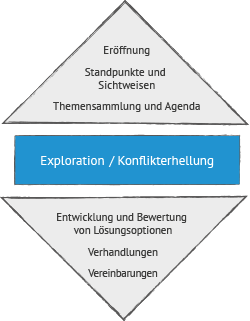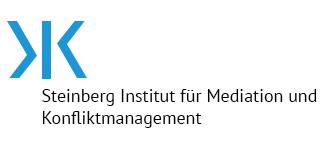Table of content
What is mediation? →
When is mediation appropriate? →
Areas of mediation →
Steps in Mediation – The Mediation Procedure →
Benefits of Mediation →
What is mediation?
Mediation is a procedure in which two or more persons with the help of a neutral mediator are able to find a mutual acceptable solution of their conflict. Contemporary mediation procedures were first developed in the U.S.A. in the sixties and seventies. Mediation enables parties in conflict to discuss their underlying needs and interests instead of just fight over legal rights and entitlements.
The mediator facilitates the process of conflict resolution, however, the decisions are only be made by the affected parties.
Mediation is a so called alternative (= out of court) dispute resolution method, a process in which the parties to a dispute, with the assistance of a neutral third party (the mediator), identify the disputed issues, develop options, consider alternatives and endeavour to reach a mutual acceptable solution of their conflict. The mediator has no advisory or determinative role in regard to the content of the dispute or the outcome of its resolution, but is responsible for the communication process whereby resolution is attempted. There are 5 elements which are essential to mediation:
- Mediation is an option (but not always totally voluntary). The parties need to be willing to participate, they must have an interest in resolving the dispute. They can either agree at the time the conflict begins, or they can incorporate an „agreement to mediate“ into their business contracts
- Mediation is confidential. No details about what occurred during the mediation, or about the settlement that was reached, can be discussed outside the mediation room without the consent of both parties.
- Mediation is basically a so called alternative dispute resolution method, usually outside the court before a legal action is taken. Mediation involves negotiation to reach consensus in contrast to litigation, where the parties may not be interested in reaching any agreement whatsoever.
- Mediation involves a neutral third party which has no authority to settle the dispute. The mediator is not a judge or arbitrator but a facilitator. A mediator simply encourages the parties to reach agreement.
- Mediation does not focus (backwards) on rights but is rather future oriented on needs and interests.
When is mediation appropriate?
Mediation is an universal dispute management method used in different conflict areas like
- commercial disputes: in or between businesses, employer and employees; units and (co)workers, …;
- disputes between partners and shareholders;
- consumer disputes;
- family disputes: divorce, conflicts about custody, payment of maintenance, …;
- inheritance disputes (also before death to determine who inherits what)
- disputes in personal injuries and damage of property;
- community and neighborhood disputes, even in criminal conflicts.
Mediation is an ideal form of conflict resolution where both parties want to continue a personal and/or working relationship. If the parties have had a working relationship, which has operated successfully over several years, formal grievance procedures could cause irreversible damage because of their adversarial nature. Mediation encourages dialogue between the parties, and encourages them to find a situation where both are winners.
Mediation is particularly useful where there are several issues in conflict. In this situation, it is often productive to trade interests in an attempt to reach a solution. Further, mediation is suitable where there is uncertainty in the rules or standards relevant to a dispute.
Mediation is useful where the parties consider privacy and confidentiality to be important.
Mediation is not suitable in the following situations:
- A conflict involving broad matters of public or government policy;
- Where the parties have ulterior motives such as wishing to use mediation to gather more information.
- Extreme power imbalance that cannot be balanced by the mediator
- Where one party is suffering from an emotional or psychological disorder.
- Mediation will not succeed where the parties refuse or are unable to assume responsibility
Mediation in practice – Areas of mediation
An overview of the rapidly growing number of organisations offering mediation services in the German private sector reveals a tendency to form organizations according to the dispute area e.g. family mediation, commercial and business mediation, construction mediation, environmental mediation, insolvency mediation, insurance mediation, administrative law mediation, social law mediation, intellectual property mediation, school mediation, community mediation and victim offender mediation (cf. Alexander/Gottwald/Trenczek: Mediation in Germany, Köln 2003):
- Family mediation refers to separation and divorce matters, parenting and custody arrangements, property settlements and family disputes about wills and inheritances.
- Commercial and business mediation compromises a wide range of mediation fields like mediation between or within businesses, mediation in succession law, workplace mediation, etc…
- Construction mediation refers to conflicts regarding building contractors, architects and engineers, property companies and clients.
- Environmental mediation refers to disputes in the public sphere involving planning, building and environmental issues. Environmental mediation differs from most other forms of mediation in the following ways: first, there are multiple parties involved such as governmental, institutional, interest groups and individuals; secondly the mediations are typically a series of public and private meetings with the various stakeholder groups; and thirdly, the issues at stake have a direct impact on the community.
- Community mediation refers to mediation that takes place at a community level: at community justice and legal centres, in schools and in other organisations that offer mediation services to the wider community
- Victim-offender mediation (VOM; in German Täter-Opfer Ausgleich TOA) was the first form of mediation to develop and find recognition in both theory and practice in Germany. The centers offer a mediation to both, victims and offender, to deal with the conflicts that led to or arise from an offense, and to settle the desipite with a mutal agreement of regarding restitution and redress.
 Steps in Mediation
Steps in Mediation
- Mediator’s Opening Statement (MOS)
- Parties‘ Statements
- Agenda Setting
- Exploring Conflicts and Interests
- Generating Options
- Initial Negotiation Pphase
- Reality Testing
- Outcome and Drafting
Benefits of mediation
Beyond the characteristic elements of mediation which differ from court procedures and other traditional decision making processes mediation provides further (process) benefits, e.g.:
- mediation saves (time, finances, social and emotional) costs,
- decision-making power remains with the parties (consensual problem solving),
- mediation can help to avoid grandstanding and deadlocks,
- focus on interests not positions,
- mediation acknoledges (inter)subjective criterias,
- privacy and confidentiality,
- development of future oriented win-win solutions, increased range of options,
- flexibility of the process: mediation is pursued within an agreed timetable,
- mediation improves communication,
- mediation will preserve and increase ongoing (business, social, private) relations,
- sustainability of agreements and client satisfaction with the agreed solutions.
